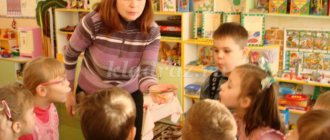Project for the development of coherent speech “Skillful Storytellers”
author: Filippova Anna Alexandrovna
Teacher-speech therapist MBDOU "Kindergarten No. 3" p. Izhma
Project for the development of coherent speech “Skillful Storytellers”
MBDOU "Kindergarten No. 3" p. Izhma
Project for the development of coherent speech “Skillful Storytellers”
Speech therapist teacher: Filippova A.A.
Relevance:
is due to the fact that currently problems
associated
with the process of development of coherent speech are the central task of the development and upbringing of children.
This is primarily due to social significance and role in the formation of personality. It is in coherent speech that the main, communicative function of speech language is realized .
Coherent speech is the highest form of speech-thinking activity, which determines the level of speech and mental development of the child. This relevance increases with children with bilingualism (in this case, Russian and Komi languages).
Problem:
Difficulties in the formation of coherent speech in children with bilingualism, the sequence of stories about the events of their lives, the ability to retell literary works, compiling stories based on a picture, and a series of pictures, compiling descriptive stories. Low level of development of creative imagination in some children
Target:
development of coherent speech in children of senior preschool age (preparatory group).
Hypothesis:
the presence of systematized ideas about modern methods and techniques for the development of coherent monologue and dialogic speech of children of senior preschool age and their appropriate use in practice contributes to improving the quality of work on the development of speech in kindergarten children and more successful preparation of preschoolers for school.
Tasks:
-improving and developing the dialogical form of speech;
-develop a monologue form of speech;
-learn to retell short tales and stories coherently, consistently and expressively;
- teach (according to a plan and model) to talk about the subject, the content of the plot picture;
-compose a story based on pictures with subsequent developing events;
-develop the ability to compose your own stories from personal experience.
Expected results of the project.
— Creation of a system of work on the development of coherent speech in children of senior preschool age.
— Positive dynamics according to diagnostic results in the development of coherent speech section.
— Preserving the health of children.
— Carrying out close interaction with the families of pupils on the development of coherent speech of children in the course of joint preparation for schooling.
— Creation of conditions in preschool educational institutions and at home that promote the development of grammatically correct, coherent speech in preschoolers.
Project participants:
Children of the preparatory group, teacher, parents, educational psychologist, speech therapist, art director, music director.
Project type:
Informational - practical, long-term, collective.
Implementation period:
Academic year (September-May)
Contents of the project.
Stage 1.
Search and preparation. (September)
Goal: Identification of the main problems in the speech development of children. Determining the main directions for further work. Drawing up methodological developments for the correction and development of children's speech. Involving parents and teachers in helping speech therapists implement the project.
Activity:
1. Diagnosis of children.
2. Questioning of parents “Development of coherent speech of children.”
3. Selection of necessary materials: literature, verbal and didactic games, visual aids, handouts and demonstration materials.
4. Drawing up pedagogical and correctional technology (long-term and individual plans, lesson notes, activities for joint activities of adults).
5. Long-term planning for coherent speech through didactic games in the senior and preparatory groups in accordance with lexical topics.
6.Creating a developmental environment in kindergarten and at home.
Stage 2.
Basic, formative. (September-April).
Goal: Testing of project activities. Formation of coherent speech of children in different types of activities. Correction of speech by adults in everyday communication with a child. Creating optimal conditions for continuity in the work of teachers and families. Increasing the level of parental motivation in correcting children's speech development.
Events
:
1. Conducting classes with a speech therapist and teachers according to long-term plans.
2. Implementation of long-term planning for coherent speech through didactic games in the senior and preparatory groups in accordance with lexical topics.
3.Reading literary works in kindergarten and at home. Conversations about what you read. (Reading fairy tales, short stories, poems, scientific literature).
4. Excursion to the children's library “Books are interesting.”
5. Exhibitions of children's books with fairy tales "Magic Country".
6.Memorization of poems, sayings, nursery rhymes.
- Information sheets for parents:
- “Verbal games and exercises in the formation of correct speech in children”
- “Family games – improvisations or how to usefully spend the evening”
- "Learning to tell"
- “Memo for literate parents”
- “Fairy tales teach us to speak”
- “By communicating, we develop speech”
- 8. Design of an album with children's drawings and stories “Winter Fun”.
- Drawing competition “My Dad”
- .Video recording of children’s stories on a lexical topic:
- "Our mothers."
- Consolidation of the material covered at speech therapy hours, at home, on the instructions of the speech therapist.
- Discussion of holiday scenarios, selection of speech material for them. Carrying out matinees and entertainment.
Stage 3.
Final, analytical. (May)
Purpose: Checking the effectiveness of the implemented project. Conducting final diagnostics of children's speech development. Analysis of the work carried out in the development of coherent speech and correction of speech disorders.
Events
:
1.Diagnostics and analysis of work results.
2.Project performance report:
3.Preparation and holding of the prom.
JOINT WORK PLAN
educator, parents, speech therapist
preparatory group for the project for the 2018-2019 academic year. year
| Period | Topic of the week | Contents of the teacher's work | Contents of a speech therapist's work | Interaction with teachers Contents of the work | Interaction with parents Contents of the work |
| 1st week of September | Day of Knowledge | Questionnaire (Appendix 1) | Diagnostics of speech development (Appendix 2) | Discussion of holiday scenarios, selection of speech material for them. Carrying out matinees and entertainment. Music managers | Information sheets for parents. (Appendix 3) Weekly recommendations on a lexical topic |
| 2-4 weeks of September | Autumn | Word games: “Describe autumn” “Which tree is the leaf from?” “Guess the vegetables and fruits by description” “Come up with beautiful words about autumn” | Week 2 – compiling a descriptive story about vegetables and fruits based on the diagram. Week 3 “Autumn has come” Arbekova N.E. Week 4 – Description of a landscape painting by I.S. Ostroukhova (1886-1887) “Golden Autumn” Arbekova N.E. | ||
| 1-2 week of October | I'm a man in the world | Compose a story in free form “Tell me about yourself, your interests, your favorite toy, game.” | Week 1 - Compilation of descriptive stories about professions using a diagram. Gomzyak O.S. Week 2 – Composing a creative story “Who I want to be” | ||
| 3-4 week of October | My village, my country, my planet | Album design “My Village”. Writing a story about a village. | Week 3 – Writing a story about your village, republic, country Week 4 – Writing a story “The house where I live” From personal experience | Compiling the story “Favorite places in my native village” | |
| 1st week of November | National Unity Day | Making panels “All people are brothers”, “All peoples are one”. | Retelling and dramatization of the fairy tale “Spikelet” using a series of plot paintings. Gomzyak O.S. | ||
| 2nd week of November | Basics of life safety | Examination of illustrations, making the album “My Safety”. | Compiling a story based on the plot picture “Home Alone”, with inventing the beginning of the story. Gomzyak O.S. | ||
| 3rd week of November | Children's Rights Day | Conversation about children's rights. | Compiling a descriptive story about clothing based on a diagram. Gomzyak O.S. | ||
| 4th week of November | Mothers Day | Learning poems about mom, writing a story about mom. | "My mom is the best" | ||
| 1-4 weeks of December | Winter. New Year | Album design with children's drawings and stories “Winter Fun”. | |||
| Week 1 - Retelling the story “Common Hill”, based on a picture with a problematic plot. Gomzyak O.S. Week 2 – Composing the story “Feeding Trough” based on a series of plot paintings by Gomzyak O.S. Lesson 12 (prep. gr.) Week 3 - compilation of the story “New Year is on the threshold” based on a series of plot paintings with a continuation of the plot. Week 4 - Compilation of stories about the celebration of New Year and Christmas. Arbekova N.E. | |||||
| 3rd week of January | Courtesy Week | Learning proverbs and sayings about politeness. | Compiling a descriptive story about wintering birds using the scheme Gomzyak O.S. | ||
| 4th week of January | Kindness Week | Reading stories about kindness. | "What is winter?" Compiling a story about winter based on plot pictures. | ||
| 1st week of February | International Mother Language Day | Reading Komi poems, stories, Komi games. | Writing stories in the Komi language | ||
| 2-3 week of February | Defenders of the Fatherland Day | “My Dad” compilation of stories. Drawing competition. | Week 2 – Compiling a story based on a series of plot paintings “Orphan Dog” O.S. Gomzyak Week 3 – Compiling a story from a series of plot paintings “The Border of the Motherland is Locked” Gomzyak O.S. | Writing stories with moms about dads and grandfathers | |
| 4th week of February 1st week of March | International Women's Day | Compiling a story “Congratulations to Mom” based on a plot picture with inventing previous and subsequent events Video recording of children's stories on the lexical topic “Our Mothers”. Compose a descriptive story about your mother based on your own drawing. | Drawing "Mom's Beloved" Art director | ||
| 2-4 weeks of March | Folk culture and traditions | Dramatization of Komi fairy tales by S. Pylaeva | Week 2 – “Maslenitsa Week” by Arbekova N.E. Week 3 – Retelling of K.D. Ushinsky’s “Four Wishes” Gomzyak O.S. Week 4 - Writing a descriptive story about trees using a diagram | ||
| 1-3 week of April | Spring | Learning poems about spring. Acquaintance with signs, composing stories. | Week 1 - Compiling a story “all’s well that ends well” based on a plot picture with inventing previous and subsequent events. Week 2 – “Journey to distant planets” - writing creative stories based on a picture plan. Arbekova N.E. Week 3 - Lexico-grammatical lesson on the topic: “Spring” | ||
| 4th week of April | Labour Day. People's work | Conversation about the work of adults in the spring. | Compiling the story “Birdhouse” based on a series of plot paintings. | ||
| 1-2 week of May | Victory Day | Reading stories on military topics. | Week 1 - “Such a terrible war” Week 2 “About war heroes” | ||
| 3rd week of May | Family day. I and my family | Making an album with children's drawings about the family. | Compiling the story “Family Dinner” based on a series of plot paintings (with creative elements) | ||
| 4th week of May | Goodbye kindergarten. | Memorizing poems. | Compiling the story “How I will spend the summer” | ||
| During the year | Excursion to the children's library “Books are interesting.” Conducting classes on production and automation of sounds. Conducting games and exercises to develop coherent speech. (Appendix 4) Conducting a system of classes by an educational psychologist using the Storytelling game (Appendix 5) | ||||
- Stage - final - May
Goal: diagnostics of the effectiveness of project activities, analysis of work results.
Project product: analytical report on the results of the project - May
Project for the development of coherent speech “Skillful Storytellers”
Project “Land of Beautiful Speech”
I present to your attention the project: “The Land of Beautiful Speech.” The name of the project was not chosen by chance; only when a child enters the land of beautiful speech will he confidently step into the land of knowledge. And we teachers must help him with this!
The Federal State Educational Standard, which came into force on January 1, 2014, contains five main directions. One of them is the speech development of children. Recently, the number of children with speech disorders has increased significantly, and quantitative and qualitative changes in their development have been observed.
Speech disorders are increasingly associated with neurological, psychological and social problems, which significantly aggravate the symptoms of speech disorders.
Taking into account this situation, this project for the activities of a speech therapist teacher at a speech therapy center at a preschool educational institution has been developed.
The project determines possible ways to include the activities of a speech therapist teacher in the work of a preschool educational institution to implement the federal state educational standard.
“It’s not easy to get into this country. The letter lives there and she will lead us along the path of beautiful speech. All children need to learn to speak correctly. We’ll rush off to this country right away. We’ll always live there. Small country Correct country They speak and write correctly There she calls us all! There will be no place in this country for rude and evil words. No Sound-Mor will take root there. We must learn to pronounce sounds. We urgently need to learn to speak correctly.”
Relevance:
The federal state educational standard for the content of the basic general education program of preschool education has determined new directions in organizing the speech development of children 3–7 years old. By the age of 7, a child’s speech development should be characterized by the ability to ask questions of an adult, in cases of difficulty, turn to him for help, adequately use verbal means of communication, and also master dialogical speech.
The Federal State Educational Standard of preschool education determines target guidelines - social and psychological characteristics of the child’s personality at the stage of completion of preschool education, among which speech occupies one of the central places as an independently formed function, namely: by the end of preschool education, the child understands oral speech well and can express his thoughts and desires.
Thus, according to the requirements of the Federal State Educational Standard, the speech development of children attending educational preschool institutions includes:
- mastery of speech as a means of communication and culture;
- enrichment of active vocabulary, development of coherent, grammatically correct dialogical and monologue speech;
- development of speech creativity;
- development of sound and intonation culture of speech, phonemic hearing, familiarity with book culture, children's literature, listening comprehension of texts of various genres of children's literature;
- formation of sound analytical-synthetic activity as a prerequisite for learning to read and write.
Speech is also included as an important component, as a means of communication, cognition, and creativity in the following target guidelines:
- actively interacts with peers and adults, participates in joint games; is able to negotiate, take into account the interests and feelings of others, empathize with failures and rejoice in the successes of others, try to resolve conflicts;
- can fantasize out loud, play with sounds and words;
- shows curiosity, asks questions regarding near and distant objects and phenomena, is interested in cause-and-effect relationships (how? why? why?), tries to independently come up with explanations for natural phenomena and people’s actions;
- has basic knowledge about himself, about the objective, natural, social and cultural world in which he lives.
In fact, none of the targets of preschool education can be achieved without mastering speech culture.
To achieve target targets, systematic prevention of speech disorders in children is necessary, since many of them have features that can disrupt the favorable course of speech ontogenesis, which most clearly manifests itself by the age of five.
Recently, the number of children with speech disorders has increased significantly, and quantitative and qualitative changes in their development have been observed. Speech disorders are increasingly associated with neurological, psychological and social problems, which significantly aggravate the symptoms of speech disorders.
In modern practice of preschool education, a number of problems arise that require solutions.
Firstly , children enter the field of professional activity of a speech therapist quite late.
Secondly , by this age, the child has already acquired a number of secondary and tertiary developmental disorders, which significantly reduce the level of his learning ability.
Thirdly , the prevention and correction of speech disorders in preschool children remains insufficiently effective if the speech disorder is not the subject of comprehensive intervention by all preschool specialists.
Based on the following, I identified a pedagogical problem:
Today, a teacher-speech therapist in a preschool speech therapy center, when we solve the maximum number of problems in the minimum period of correctional work while the level of speech disorders is becoming more complex, needs to find forms of work aimed at the prevention and correction of speech and personality disorders.
To find a way out of this situation, I, as a specialist working with children with speech disorders, developed the project “Country of beautiful speech - teach me to speak correctly.”
Target:
- Organization and creation of conditions for preventive work of a teacher-speech therapist at the Skazka MBDOU with children 5-6 years old.
Tasks:
- identification and timely prevention of speech disorders;
- development of all components of speech (articulatory motor skills; physiological breathing; development of tempo, rhythm of speech, coordination of speech with movement; development of auditory attention and phonemic perception; clarification, expansion and enrichment of the lexical side of speech; formation of the grammatical structure of speech; development of coherent speech of preschoolers 5-6 years);
- ensuring continuity in work with parents of pupils and employees of preschool educational institutions;
- caring for the health, emotional well-being and timely comprehensive development of each child;
- creative organization of the educational process.
Achieving the set goal and solving problems is carried out taking into account the following principles:
- the principle of a proactive approach, which dictates the need to identify children with functional and organic developmental disorders, on the one hand, and the development of adequate speech therapy intervention, on the other;
- the principle of the developmental approach (based on L. S. Vygotsky’s idea of the “zone of proximal development”), which is that learning should lead to the development of the child;
- the principle of consciousness and activity of children, meaning that the teacher must provide in his work methods for activating the cognitive abilities of children. The child must be given cognitive tasks, in solving which he relies on his own experience. This principle promotes more intensive mental development of preschool children and provides for the child’s understanding of the material and its successful application in practical activities in the future;
- the principle of accessibility and individualization, which involves taking into account age, physiological characteristics and the nature of the pathological process;
- the principle of gradually increasing requirements, which involves a gradual transition from simpler to more complex tasks as the developing skills are mastered and consolidated;
- the principle of clarity, ensuring close interconnection and broad interaction of all analytical systems of the body in order to enrich the auditory, visual and motor images of children.
Taking into account these priority goals, objectives and principles, this project for the activities of a speech therapist at the speech therapy center of the Skazka MBDOU has been developed. The project determines possible ways to include the activities of a speech therapist at the MBDOU in the work of a preschool educational institution to implement the federal state educational standard for the content of the basic general education program of preschool education.
Methods:
- verbal (individual conversations, consultations);
- practical (conducting seminars and workshops);
- visual (selection of speech material on lexical topics, display of multimedia presentations, demonstration of didactic material, reminders for parents, magazine for parents “My Talker”);
- gaming (games, physical education, articulation, breathing and finger exercises).
Logistics:
- Computer, multimedia installation, didactic games for speech development, mirrors, toys for breathing development, musical instruments, audio recordings with various sounds, jingle jars, lacing, puzzles, mosaics, etc.)
Staffing:
- Teacher speech therapist;
- MBDOU teachers,
- music worker,
- head of physical education,
- children and parents of the older group.
Technologies:
- Collaborative technology;
- Speech therapy examination technology;
- Technologies for the formation of speech breathing;
- Technologies for the development of intonation aspects of speech;
- Technologies for correcting the tempo-rhythmic organization of oral speech;
- Computer techologies.
Expected Result:
- An increase in the number of children with normal speech development and a decrease in the number of children aged 5-6 years with a low level of speech development.
The project is long-term. Implementation period – 1 year.
Stage 1 – preparatory (diagnostic; information and analytical).
Tasks:
- Monitor the speech development of children 5-6 years old.
To find out the educational needs of teachers and parents, their level of competence in matters of speech development, establish contact with them, and coordinate the educational impact on children.
Stage 2 – main (practical).
Tasks:
- develop and test a system of methodological activities for teachers and parents on the speech development of preschoolers aged 5-6 years through organizing and conducting events.
Stage 3 – final (control and diagnostic).
Tasks:
- To analyze the effectiveness of the preventive work of a speech therapist with teachers and parents on the speech development of children 5-6 years old.
Diagnostic work is carried out in sections according to the methodology of N.V. Serebryakova, including a speech therapy examination of children of senior preschool age at a preschool educational institution (beginning and end of the year), in order to make speech therapy conclusions, as well as determine priority areas of preventive work.
The system of correctional and preventive process can be depicted as a circle of specialists: a teacher-speech therapist, educators and parents. Moreover, parents should be on the same level as specialists. And this can only be achieved through educational activities about normal child development and possible pathologies, because This is one of the conditions for the full speech development of preschool children.
The best results are observed where speech therapists, educators and parents act in concert. As part of the project, when working with teachers and parents, it is important to form multilateral interaction among all participants in the correctional and preventive process.
To achieve this goal, I have identified a range of tasks that need to be solved. To achieve this, teachers and parents:
- must clearly understand the purpose of their activities, which is the full development of the child and coordinated interaction among themselves.
- must be armed with the necessary tools for work (special knowledge necessary to understand the importance and mechanism of influence on the development of a child’s speech, practical skills in assisting the child in correcting and preventing speech development).
Interaction between specialists and parents
Educational block
- Acquaintance with age-related characteristics of neuropsychic development, stages of development of children's speech;
- Familiarization with the results of diagnostics of speech development of children;
- Creating five-minute sessions with games and exercises;
- Design of stands with general recommendations;
Practical block
- Demonstration of techniques for correcting and developing speech during consultations;
- Conducting thematic seminars - workshops, joint entertainment.
Forms of work of a speech therapist with teachers in MBDOU on the prevention of speech deficiencies in children
- consultations master classes;
- seminars - workshops;
- weekly provision of calendar planning on lexical topics;
- organization of a mini-library “Correctional work on the speech development of preschool children.”
Forms of work of a speech therapist with parents
- survey;
- parent meetings;
- seminars - workshops;
- consultations;
- five-minute speech therapy sessions on lexical topics;
- Design of the information and methodological stand “Tips from a speech therapist” (“Games in the kitchen”, “On the way to kindergarten”, etc.)
- reminders for parents;
- magazine "My Talker";
- individual consultations.
All this work allows parents to create a positive emotional mood for working together to raise and educate their children, since parents can clearly see the problems of their own children and methods for solving them.
Assessment of the quality of activities
The effectiveness of the project can be seen in the following:
- Increasing the efficiency and quality of correctional and preventive services provided.
- Modernization of the correctional and preventive process through the introduction of computer technologies and joint activity technologies. Project performance indicators.
An increase in the number of children with normal speech development and a decrease in the number of children aged 5-6 years with a low level of speech development.
Evaluation mechanism:
- Diagnosis of speech development in older children;
- Analysis of children's speech development.
PERSPECTIVE PLANNING OF PREVENTIVE WORK OF A Speech-Language Pathologist TEACHER OF MBDOU "FAIRY TALE" IN THE SENIOR GROUP
| Period | The content of the work | Note |
| September | 1.Parent survey Appendix No. 1 2. Monitoring the development of speech in older children Appendix No. 2 3.Analysis of monitoring results and identification of priority areas for children’s speech development 4. Parent meeting on the topic: “Speech development of children 5-6 years old”; Monitoring results Appendix No. 3 | 1. Conducted by a speech therapist teacher 2.Teacher-speech therapist and educators 3.Teacher-speech therapist 4.Teacher-speech therapist and educators |
| October | 1. Weekly provision of calendar planning to teachers and specialists of MBDOU and five-minute speech therapy sessions for parents on lexical topics according to block-by-block planning. Appendix No. 4 2. Workshop for parents of older children “Teach children to speak correctly” Appendix No. 5 3. Poster consultation for parents “Why finger gymnastics is needed” Appendix No. 6 4. Organization of a mini-library “Correctional work on the speech development of preschool children” 5. Weekly classes on speech development, united by a single lexical topic and the idea of traveling to the land of beautiful speech. | 1. Developed by a speech therapist teacher, conducted by educators and specialists from MBDOU 2.Teacher-speech therapist and parents 3.Teacher-speech therapist 4.Teacher-speech therapist 5.Teachers |
| november | 1. Weekly provision of calendar planning to teachers and specialists of MBDOU and five-minute speech therapy sessions for parents on lexical topics according to block-by-block planning. 2. Issue of the magazine “My Talker” No. 1 3.Individual consultations 4. Weekly classes on speech development, united by a single lexical topic and the idea of traveling to the land of beautiful speech. | 1. Developed by a speech therapist teacher, conducted by educators and specialists from MBDOU 2.Together a teacher-speech therapist and educators 3.Teacher-speech therapist and educators 4.Teacher |
| December | 1. Weekly provision of calendar planning to teachers and specialists of MBDOU and five-minute speech therapy sessions for parents on lexical topics according to block-by-block planning. 2. Master class for teachers on the topic: “Articulation gymnastics” 3. Poster consultation for parents on the topic: “Why is articulation gymnastics needed?” Appendix No. 7 4. Memos for parents Appendix No. 8 5. Weekly classes on speech development, united by a single lexical topic and the idea of traveling to the land of beautiful speech. | 1. Developed by a speech therapist teacher, conducted by educators and specialists from MBDOU 2.Teacher-speech therapist 3.teacher-speech therapist 4. speech therapist teacher 5.teacher |
| January | 1. Weekly provision of calendar planning to teachers and specialists of MBDOU and five-minute speech therapy sessions for parents on lexical topics according to block-by-block planning. 2.Individual consultations 3. Weekly classes on speech development, united by a single lexical topic and the idea of traveling to the land of beautiful speech. | 1. Developed by a speech therapist teacher, conducted by educators and specialists from MBDOU 2.teacher-speech therapist and educators 3.teacher |
| February | 1. Weekly provision of calendar planning to teachers and specialists of MBDOU and five-minute speech therapy sessions for parents on lexical topics according to block-by-block planning. 2. Issue of the magazine “My Talker” No. 2 3. Poster consultation for parents on the topic: “Why you need to be able to speak correctly and beautifully” Appendix No. 9 4. Weekly classes on speech development, united by a single lexical topic and the idea of traveling to the land of beautiful speech. | 1. Developed by a speech therapist teacher, conducted by educators and specialists from MBDOU 2.Together a teacher-speech therapist and educators 3. Speech therapist teacher 4.teacher |
| March | 1. Weekly provision of calendar planning to teachers and specialists of MBDOU and five-minute speech therapy sessions for parents on lexical topics according to block-by-block planning. 2. Poster consultation for parents on the topic: “On the way to kindergarten” 3. Weekly classes on speech development, united by a single lexical topic and the idea of traveling to the land of beautiful speech. | 1. Developed by a speech therapist teacher, conducted by educators and specialists from MBDOU 2.Teacher-speech therapist 3.teacher |
| April | 1. Weekly provision of calendar planning to teachers and specialists of MBDOU and five-minute speech therapy sessions for parents on lexical topics according to block-by-block planning. 2. Poster consultation for parents on the topic: “Games in the kitchen” 3. Weekly classes on speech development, united by a single lexical topic and the idea of traveling to the land of beautiful speech. 4. Entertainment on the theme: “Celebration of beautiful speech” | 1. Developed by a speech therapist teacher, conducted by educators and specialists from MBDOU 2.teacher-speech therapist 3. teacher 4. Together the teacher-speech therapist, educators, music director children and their parents |
| May | 1. Weekly provision of calendar planning to teachers and specialists of MBDOU and five-minute speech therapy sessions for parents on lexical topics according to block-by-block planning. 2. Weekly classes on speech development, united by a single lexical topic and the idea of traveling to the land of beautiful speech. 3. Issue of the magazine “My Talker” No. 3 4.Monitoring of speech development of older children 5.Analysis of speech monitoring and effectiveness of project implementation | 1. Developed by a speech therapist teacher, conducted by educators and specialists from MBDOU 2. teacher 3.Shared speech therapist, educators and specialists 4. Speech therapist teacher 5. Teacher-speech therapist, educators and specialists of MBDOU. |
BLOCK-BLOCK PLANNING OF WEEKLY PREVENTIVE WORK OF A Speech-Language Pathologist TEACHER ON LEXICAL TOPICS IN A SENIOR GROUP
| OCTOBER | |
| 1 Week | "Autumn. Signs of autumn", "Trees in autumn" |
| 2 week | "Vegetables", "Vegetable garden" |
| 3 week | "Fruit", "Garden" |
| 4 week | "Mushrooms, berries, forest" |
| NOVEMBER | |
| 1 Week | "Cloth" |
| 2 weeks | "Shoes" |
| 3 week | "Toys" |
| 4 week | "Dishes" |
| DECEMBER | |
| 1 Week | "Winter", "Wintering Birds" |
| 2 week | "Pets in Winter" |
| 3 week | "Wild Animals in Winter" |
| 4 week | "New Year" |
| JANUARY | |
| 2 week | "Furniture", "Parts of furniture" |
| 3 week | "Freight and passenger transport" |
| 4 week | "Professions in transport" |
| FEBRUARY | |
| 1 Week | "Kindergarten. Professions. Labor actions." |
| 2 week | "Studio. Seamstress. The cutter. Labor actions" |
| 3 week | "Construction. Professions. Labor actions" |
| 4 week | "Our Army" |
| MARCH | |
| 1 Week | "Spring. Signs of spring. Arrival of birds" |
| 2 week | "Houseplants" |
| 3 week | "River, lake and aquarium fish" |
| 4 week | “My small homeland is Mezhdurechensky” |
| APRIL | |
| 1 Week | “Our home is Ugra” |
| 2 week | "Space" |
| 3 week | “Where did the bread come from?” |
| 4 week | "Mail" |
| MAY | |
| 1 Week | "Traffic Laws" |
| 2 week | "Insects" |
| 3 week | "Summer is coming soon" |
Used Books:
- NOT. Veraksa, T.S. Komarova, M.A. Vasilyeva.
- Program “From birth to school” M.-MOSAIKA-SYNTHESIS 2010
- N.V. Nishcheva Program of correctional developmental work in the speech therapy group of a kindergarten for children with general speech underdevelopment SPb CHILDHOOD-PRESS, 2007
- N.V. Nishcheva “System of correctional work in a speech therapy group for children with general speech underdevelopment” St. Petersburg DETSTVO-PRESS, 2005
- E.F. Kurmaeva. Correctional and speech therapy work with children 5-7 years old, Teacher 2012
- V.M. Akimenko New speech therapy technologies Phoenix, 2009
- Winnicott D.V. Conversation with parents Independent, 1994
- EAT. Kosinova Speech therapist lessons. Games for speech development OLISS, 2011
- O.I. Krupenchuk Teach me to speak correctly “Litera”, 2001
- E.V. Kuznetsova, I.A. Tikhonova Development and correction of speech of children 5-6 years old M.2005
- M.Yu.Kartushina Notes on logorhythmic classes with children 5-6 years old M. 2007
- Order of the Ministry of Education and Science of the Russian Federation of October 17, 2013 No. 1155
Pogodina Anisa Rafgatovna, teacher-speech therapist, MBDOU "Fairy Tale" Khanty-Mansi Autonomous Okrug. Mezhdurechensky
- Series of lessons “Land of Beautiful Speech”
- Creative project in the middle group for children with general speech underdevelopment based on the fairy tales of V. Suteev
- Scenario for speech therapy leisure “Journey to the City of Beautiful Speech”
- Frontal final speech therapy lesson in the preparatory group [Journey to the country of Competent and Beautiful Speech]
- Project “Favorite Poems”
( 3 liked, average score: 5.00 out of 5)
Loading...





